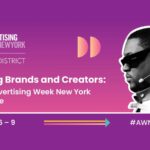By Joe Conrad, Founder & CEO, Cactus
At this year’s Advertising Week 2023 event in New York a few weeks ago, Joe Conrad, founder of the agency Cactus, Denver, assembled a panel of agency colleagues to discuss a subject many want to avoid – mental health in the advertising community. During the session entitled “Head Check for Adland: How Agencies are Looking After Their Teams’ Mental Health,” Conrad advocated for agencies to commit to mental health for employees in much the same way it commits to workplaces that are diverse, equitable, and inclusive. Conrad expands on the topic here.
Advertising agencies occupy rarified air in the corporate world regarding how much we think about our culture and create a nurturing workplace for our employees. Agency leaders go to great lengths to help ensure that our teams are well-compensated, receive excellent benefits, do career-making work, have flexible schedules, and get to do it all in a fun, creative environment.
Most recently, agencies in every market and of all sizes made a renewed commitment to workplaces that are Diverse, Equitable, Inclusive, Belonging, and Well-being. We understand how important DEI&B is to our culture, and the work we produce, to ensure that the make-up of our teams represents the communities where we live and work.
We are more aware than ever of the importance of hiring and retaining teams that are fully inclusive of female, BIPOC, and LGBTQIA+ talent vital to the success of a modern agency. We have invested in DEI training for our leaders and teams to make them more aware of these issues and how they not only affect our agency culture but also our ability to create meaningful work that we put out into the world.
No other industry goes to the lengths that ours does to ensure that we’re setting the standard for employee satisfaction. However, I propose that there is one more missing element that would not only improve the lives of our employees, but that would also help our agencies thrive. And that thing is employee well-being.
Mental Health: It Isn’t Just For Some People
Let’s face it, agencies can at times be draining, and stressful, experiences for our teams. Pressure to create innovative, game-changing work, under intense deadlines, can be hard for even the most seasoned agency pros. That’s why it’s more important than ever to think about, talk about, and take action to improve the well-being of our teams.
Webster defines well-being as a state of being happy, healthy, and successful. Today, what has emerged are five essential pillars of well-being: mental, physical, emotional, occupational, and social. Let’s start with what I believe is the most important of these pillars, mental health.
Mental health isn’t just for some people, it is critically important for each one of us. It is the lynchpin to all other aspects of our lives. It’s what helps us form good, healthy habits and it drives all our behavior. When we admit that all of us are somewhere along the continuum of mental health and well-being, the stigma disappears because we realize that we all could be more balanced, focused, and mentally strong.
All five pillars of well-being are related and interconnected. A recent Harvard study on longevity and happiness found that in addition to taking care of your physical health by eating well, exercising regularly, and not abusing your body with alcohol, smoking, or drugs, two other factors play a huge role in leading a happy life. Those two things are finding purpose in your work and having good friends in your life that you can turn to when you need support.
Cactus, the agency I founded in 1990 in Denver, has made mental health and well-being a central focus of our work for years. However, I realize that many agencies, they’re just beginning their journey of understanding the issue and implementing solutions to help their employees. Here are a few suggestions to help you get started:
- A great way to educate yourself and your agency is by doing work in the space. For us it was a passion project the agency launched that dared to use humor to get men to think about and take charge of their mental health. The success of that campaign led my alma mater, Colorado State University, to reach out to help them address the mental health crisis on campus after suffering 17 student suicides in two years. This challenge inspired our team at Cactus to create a mental well-being platform that helps college students navigate life and campus. Intensive work on those two assignments for clients gave our agency the quantum leap we needed to truly understand the crisis of mental health society faces.
- Commit to providing tools to truly help your employees thrive in their lives:
For many agencies today, providing access to therapy or free app memberships is where they’re at on their journey. And that’s great — we do those things too. But you can go further. Our agency uses a personalized mental well-being platform for our employees that focuses on three primary well-being areas: Succeed, career, and financial; Thrive, physical and mental; and Matter, purpose, meaning, and social connections. It also contains assessments, personalized planning tools, ad agency life hacks, and more than 2,000 evidence-based resources to support employees in every aspect of their lives. - As we ramp up our DEB&I efforts, don’t forget the W: The push towards better representation in our agency teams, in our work, how it’s produced, and where it runs was long overdue. Diversity, equity, inclusion, and belonging are essential pillars in building a thriving agency culture that attracts and retains top talent. DEIB&W is also a strategic imperative to build a modern, relevant agency that’s indispensable to its client partners. But I also believe it’s past time for the advertising industry to consider adding a “W” for well-being so that our agency diversity initiatives also take into account the well-being of the whole employee, inclusive of their mental health. In particular, recognizing the disproportionate mental health impacts on BIPOC employees in our workforce.
Mental health and well-being are truly the next frontier in the ever-present battle for great talent, reclaiming the relevancy of advertising agencies as sought-after workplaces once again –– and an important new way for agencies to create more welcoming and inclusive cultures.
I’ve always believed that ad agency ingenuity and creativity can solve any problem – there’s no better place for us to apply our talents than making sure every agency employee is surrounded by the people, policies, and tools that help them take care of their mental health and wellbeing. Our people and our work can both thrive together.








